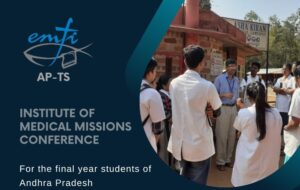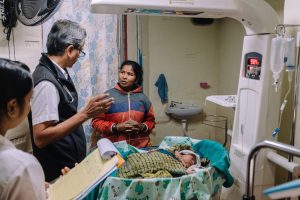Can Dental departments survive? Can the patients who come there afford the cost of care?
Hospitals in remote rural areas working among poor patients will see many patients with dental problems – diseases affect rich and poor alike. However, many poor patients don’t consider investing in dental treatment as a priority. A passionate dentist can talk to patients waiting in the OPD and ask them to come and see him/her for a free checkup and then suggest treatment. If they are happy and satisfied, they will tell their neighbours and friends – that is how all specialities develop in these hospitals. If workloads are very light for a period of time, dentists can volunteer to help in other departments – such as store management or quality control. Since they also have very little work during nights, they could get involved in the social activities in the campus.
What is my role in remembering the poor?
We must all become ‘poor-conscious’ – meaning aware of the poor, their circumstances and their needs. We should then think of how we (as individuals, families and institutions) can help them in their time of need. God has provided us with time, talents and treasure – some of this should be invested on those who can’t hope to repay. It could be in providing charity, designing low-cost protocols for treatment, spending time in understanding challenges and discovering innovative ways to help meet basic necessities with what is available etc.
How can mission hospitals face financial challenges in the coming months?
At our hospital, we have faced a number of severe financial crises in the past and as soon as the present crisis came we activated our short-term response protocol.
Short term (1-2 months): All non-essential expenses were cancelled. Some supplier (and other) bills were rescheduled. Fixed salaries will be paid to all staff – with the balance kept as due. Staff donations to the hospital or to those who could not be provided with employment (daily wage workers) were received and distributed.
Medium-term (2-6 months): Depending on capacity utilization of services, bed-strength can be reduced, if it appears that the situation would persist, services of staff on contract and probation need not be extended. Hospitals that have savings in Fixed Deposits can use them. Hospitals that receive grants from within the country or outside, can request donors to redirect these amounts to keep the hospital functioning. People will still have to go somewhere for their treatment – they will deliver babies and have medical/surgical emergencies – protocols may need to be changed so that these problems are managed while safeguarding the staff and other patients and the services should be provided at a cost that people can afford – this is a business challenge.
Long term (more than 6 months): If the crisis continues into the long-term, it will probably be classified as a national disaster. “Force Majeure” clauses will come into play and contracts/agreements will be set aside to help institutions survive – institutions may need to shed all unnecessary staff. At this point, hospitals will have to position themselves to the evolving need around them, staff may need to work without salary or only on subsistence salary (this may be acceptable as it will probably affect the entire country). If all else fails, hospitals will have to temporarily close.
Recovery: The most vulnerable hospitals are those that have adverse working factors – such as low bed occupancy, high staff expense (as a percentage of total expense) and high donor dependency. Those that are least vulnerable will quickly bounce back when the situation starts to resolve. Those that have adverse factors will have to work on resolving issues which pull them down in order to become more resilient in the future.
Will there ever be justice from the Government?
Most laws are made with good intentions. Their interpretation could be faulty. We must engage with the government to resolve issues that affect us. Often, mission hospitals look at the government as an adversary or as someone who is corrupt, not worthy of trust – this has to change. At our hospital, most issues that we have faced have been resolved by engagement. We also have a Public Private Partnership with the government which allows us to attend their meetings and they visit and partner with us – we look at each other as working towards the same goals and help fill in gaps in each other’s weaknesses. That is the way forward.
What will be the emerging needs from the community?
The poor will suffer the most. They are already vulnerable and crisis situations will make them destitute. A great challenge will be to innovate and create ways of providing high quality effective care in an efficient and sustainable manner to the poor. The government is suggesting that telemedicine services could help – but this is a solution for the rich who have access to smartphones and e-commerce sites. Non-Covid problems have been set aside during the lockdown but they can’t be suppressed altogether. There will be much higher (compared to Covid related) morbidity and mortality due to these being ignored in the long-term. Access to healthcare has to be improved while exercising safety measures. With no vaccine or successful cure for the virus, we are likely to face this situation over the long term (probably months to years) and will need to adapt to a ‘new normal’ way of functioning and reinvent new protocols for the management of the same diseases.
What will we do if the pandemic hits us hard?
Almost all the hospitals have prepared during the lockdown period for an increase in Covid patients coming to them. This includes screening, triage, PPEs, isolation/quarantine, referral and management (for designated Covid hospitals). It is possible that the situation could become bad quickly and government facilities could be overwhelmed with huge numbers of patients in the community coming to the hospital. People with co-morbidities and advanced age who are at higher risk of mortality should be safeguarded, high-risk but low-priority (elective) procedures should be deferred and hospitals should function with maximum safety. It is impossible to be completely safe (the best hospitals in the wealthiest countries are unable to prevent death – among their own staff and among the pa.tients who come to them) – we will simply have to do our best and leave the rest to God. In our area, most buildings are strengthened because we are in a Grade V seismic zone – however, if a huge earthquake hit, nothing can save the buildings or the people inside. That would be beyond what anyone can plan or prepare for – we have a Sovereign God and we should simply trust Him. I have written about this here: https://the-sparrowsnest.net/2020/04/05/a-christian-hospital-in-the-time-of-covid19/
How can we be better prepared?
We live at a time when information is available at our fingertips – we can find out everything on a topic without leaving our homes. We also have access to phones, email and social media to discuss and debate every issue. We can prepare for any eventuality by using our intellect and the sources at our disposal to understand the challenges before us and prepare solutions for them with the constraints that we face.
Beyond this, we should also develop a deep personal relationship with God and learn to trust and obey Him. Slowdowns give opportunities to do things that are not normally possible in our busy lives – we can learn new things, help people who are far away and plan/prepare for the future. We must also realize that our lives in this world are finite and unpredictable. Our opportunity to do something of eternal value recedes with each passing day. We should, therefore, use our time wisely and work to please God and find His approval in all our thoughts, words and actions. We should build up treasures in Heaven and not on earth. Some thoughts for a Christian missionary or a Mission institution are here:
https://www.researchgate.net/publication/338914047_NOT_THE_PATTERNS_OF_THE_WORLD
Dr. Vijay Anand Ismavel MS, MCh
Makunda Christian Leprosy & General Hospital
[email protected]









